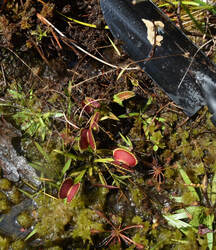Venus Flytrap Champions
recognizing & assisting landowners with Venus Flytrap on their property
WHY WE ARE HERE Help us to defend populations of the amazing Venus Flytrap! |
Surveys of known populations of Venus Flytrap in the Carolinas in 2019 and 2020 documented a continuing decline due to urban/suburban development and a lack of burning where appropriate habitat for this rare, charismatic plant species still exists.
|
|
Venus Flytrap Champions recognizes and assists landowners and land managers in the Carolinas who want to care for populations of this rare carnivorous species. We believe landowners can play a significant role in maintaining and increasing the remaining habitat for
|
Venus Flytrap and the other insectivorous and uncommon plant species that grow with it. We are collaborating with the following agencies and nonprofit organizations to create a support network for people managing Venus Flytrap habitat on private property:
|
|
Flytrap License Plate Approved for NC
North Carolinians will soon have a new specialty license plate to choose from at the NC DMV, thanks to a bill passed by the North Carolina General Assembly in late June and signed into law by Governor Roy Cooper on July 3, 2024. LEARN MORE |
|
|
|
June 2024— The Flytrap Forum held in Boiling Spring Lakes May 30 was a success. About 55 people--local residents, Flytrap relocation volunteers, land owners, scientists, and Waccamaw Siouan tribal members--came to hear updates from agencies, organizations, and individuals working with Venus Flytrap populations. Covered topics included Flytrap rescue efforts, recent and ongoing research (reproductive ecology, insect relationships, genetics and seed banking, etc.), Fish & Wildlife Service status review, and a panel discussion on current and future threats to Flytrap populations. The day began with a recognition ceremony for new Flytrap Champions: four NC Wildlife Resources Commission officers--Captain Brandon Dean, Sergeant Matthew Criscoe, Master Officer Bradley Jordan, and Senior Officer Jason Munson--for their continued efforts to apprehend Venus Flytrap poachers in southeastern North Carolina (see March 2024 news item, below) .
March 2024 — Officers with the NC Wildlife Resources Commission obtained arrest warrants for two people accused of stealing nearly 600 Venus flytraps from Nature Conservancy land in the Boiling Spring Lakes area. READ about it.
December 2023 — A new article in Mother Jones examines the decision not to list Venus Flytrap as a federally threatened/endangered species and profiles the work of Venus Flytrap Champions.
November 2023— Venus Flytrap is featured in a blog about about the people and programs of the N.C. Department of Agriculture and Consumer Services. READ "Venus Flytraps: Homegrown North Carolina Wonders" by Michael Manganello.
|

August 30, 2023 — Boiling Springs Lakes, NC:
Under a permit with the City of Boiling Spring Lakes from the NC Plant Conservation Program (NC Dept. of Agriculture), a total of at least 1100 flytraps were relocated by energetic volunteers from wet roadside ditches to appropriate habitat on a safe site on city property. Local residents were assisted by volunteers from the NC Native Plant Society, North American Sarracenia Conservancy, and summer interns with TheNature Conservancy. The following article in Coastal Review profiles this rescue and relocation: Coastal Review article An earlier effort in the Boiling Spring Lakes area (September 2022) is profiled in this article by Patty Langer in Southport Magazine:
Check out our News Archive HERE.
| ||||||
